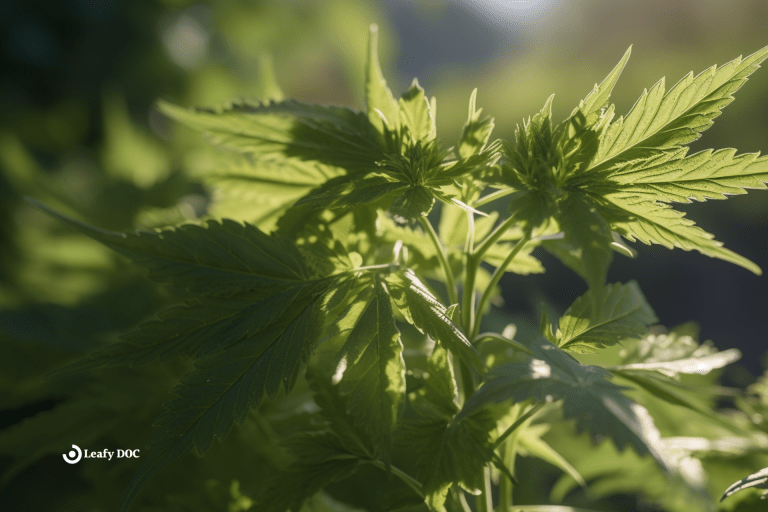Understanding The Connection Between Cannabis And Schizophrenia
by Ayesha Aziz · February 28, 2024
Unveiling the Surprising Link: Cannabis and Schizophrenia – Learn how cannabis could be affecting mental health and its potential association with schizophrenia. Click now to understand the truth behind this controversial connection and protect your wellbeing!

Do you ever wonder about the connection between cannabis and schizophrenia?
It’s a topic that has been heavily debated and studied in the scientific community.
In this article, we will delve into the effects of cannabis on brain chemistry and explore the association between cannabis use and schizophrenia.
By understanding the risk factors for schizophrenia and the role of genetics in the cannabis-schizophrenia connection, we can gain a better understanding of this complex relationship.
Additionally, we will discuss potential treatment approaches for cannabis-induced schizophrenia, providing insights that may be helpful for those seeking to serve others dealing with this condition.
So, let’s dive in and unravel the mysteries surrounding the connection between cannabis and schizophrenia!
Key Takeaways
- Medication (antipsychotic) can be effective in managing symptoms of cannabis-induced schizophrenia.
- Cognitive-behavioral therapy (CBT) is a valuable treatment approach for individuals with cannabis-induced schizophrenia.
- CBT focuses on identifying and changing negative thought patterns and behaviors, which can be beneficial for managing symptoms.
- Seeking professional treatment and exploring potential approaches can provide support for individuals with cannabis-induced schizophrenia to manage their symptoms and live fulfilling lives.
The Effects of Cannabis on Brain Chemistry
Did you know that cannabis, a widely used recreational drug, can have a profound impact on the chemistry of your brain?
When you consume cannabis, the active chemical compounds in the plant, such as THC, interact with receptors in your brain called cannabinoid receptors. These receptors are found throughout your brain and are part of the endocannabinoid system, which plays a crucial role in regulating various physiological and cognitive processes.
When THC binds to these receptors, it can disrupt the normal functioning of your brain. It can affect the release of neurotransmitters, which are chemical messengers that allow neurons to communicate with each other. This can lead to changes in the balance of neurotransmitters in your brain, impacting various functions such as mood, memory, and perception.
Additionally, cannabis use can also alter the levels of dopamine in your brain. Dopamine is a neurotransmitter that plays a role in reward and motivation. When you consume cannabis, it can increase the release of dopamine, which can create feelings of pleasure and euphoria. However, prolonged and excessive cannabis use can lead to a decrease in dopamine levels, which can contribute to a decrease in motivation and anhedonia, or the inability to experience pleasure.
Understanding the effects of cannabis on brain chemistry is important, especially when considering the potential link between cannabis use and schizophrenia. While not everyone who uses cannabis will develop schizophrenia, research suggests that heavy and prolonged cannabis use can increase the risk of developing this mental illness, particularly in individuals who are already predisposed to it.
By being aware of how cannabis can impact your brain chemistry, you can make informed decisions about its use and prioritize your mental health.
The Association Between Cannabis Use and Schizophrenia
Explore the intriguing link between cannabis use and schizophrenia, and discover how it may affect you personally. It’s important to understand the potential risks and implications of using cannabis, especially if you have a family history of mental illness or are predisposed to schizophrenia.
While the relationship between cannabis and schizophrenia is complex and still being studied, there is evidence to suggest a possible association. Here are four key points to consider:
- Increased risk: Research has shown that regular cannabis use, especially during adolescence, may increase the risk of developing schizophrenia later in life. If you have a family history of schizophrenia or other mental health disorders, it’s important to be cautious and aware of the potential risks.
- Genetic vulnerability: Some studies have found that individuals with a specific genetic vulnerability may be more susceptible to the development of schizophrenia when using cannabis. This means that certain individuals may be at a higher risk than others, depending on their genetic makeup.
- The role of THC: Tetrahydrocannabinol (THC), the psychoactive compound in cannabis, has been found to have a significant impact on brain chemistry. It can affect the levels of dopamine, a neurotransmitter associated with psychosis, in the brain. This suggests that THC may play a role in the development or exacerbation of schizophrenia symptoms.
- Early intervention: If you are already experiencing symptoms of schizophrenia or have been diagnosed with the condition, it is crucial to avoid cannabis use. Studies have shown that cannabis can worsen symptoms and interfere with treatment effectiveness. Seeking early intervention and following a treatment plan prescribed by a healthcare professional is essential for managing schizophrenia effectively.
Understanding the association between cannabis use and schizophrenia is vital for making informed decisions about your health. If you have concerns or questions about how cannabis may affect you personally, it’s always best to consult with a healthcare professional who can provide guidance and support based on your circumstances.
Understanding the Risk Factors for Schizophrenia
One of the major risk factors for schizophrenia is a genetic predisposition, which can greatly increase the likelihood of developing the disorder. If you have a family history of schizophrenia, it means that you may be more vulnerable to developing the condition yourself. This genetic predisposition can be passed down through generations, putting you at a higher risk. While having a genetic predisposition does not guarantee that you will develop schizophrenia, it does increase your chances compared to someone without a family history of the disorder.
To better understand the risk factors for schizophrenia, let’s take a look at a table that outlines some of the common factors associated with the development of the disorder:
| Risk Factors | Explanation | Examples |
|---|---|---|
| Genetic Predisposition | Increases the likelihood of developing schizophrenia | Having a family history of the disorder |
| Environmental Factors | Can trigger the onset of schizophrenia in those with a genetic predisposition | Exposure to stress or trauma |
| Substance Abuse | Substance use, particularly cannabis, can increase the risk of developing schizophrenia | Regular and heavy cannabis use |
Understanding these risk factors can help you take proactive steps to protect your mental health. If you have a family history of schizophrenia, it may be beneficial to speak with a healthcare professional who can assess your risk and provide guidance on how to manage it. Additionally, being aware of environmental factors and avoiding substance abuse, particularly cannabis can also contribute to reducing your risk of developing schizophrenia.
The Role of Genetics in the Cannabis-Schizophrenia Connection
To truly grasp the role of genetics in the link between cannabis and schizophrenia, you must delve into the intricate web of biological factors at play.
While it’s true that cannabis use can increase the risk of developing schizophrenia, it’s not the sole cause of the disorder.
Genetics also play a significant role in determining an individual’s susceptibility to developing schizophrenia. Research has shown that individuals with a family history of schizophrenia are more likely to develop the disorder themselves, especially if they also use cannabis.
This suggests that there may be certain genetic variations that increase the risk of both schizophrenia and cannabis use. However, it’s important to note that not everyone with these genetic variations will develop schizophrenia, and not everyone who develops schizophrenia will have these genetic variations.
Understanding the role of genetics in the cannabis-schizophrenia connection is crucial for developing effective prevention and treatment strategies. By identifying specific genetic markers associated with an increased risk of developing schizophrenia, researchers can work towards developing targeted interventions that can help individuals at high risk.
This knowledge can also help healthcare providers tailor their approach to treating individuals with schizophrenia, taking into account their unique genetic makeup. Ultimately, by understanding the genetic factors involved in the cannabis-schizophrenia connection, we can strive towards better serving those affected by this complex disorder.
Potential Treatment Approaches for Cannabis-Induced Schizophrenia
There are potential treatment approaches available for individuals who develop schizophrenia as a result of cannabis use. If you or someone you know is struggling with cannabis-induced schizophrenia, it’s important to seek professional help and explore the various available treatment options.
One potential approach is medication, which can help manage the symptoms of schizophrenia and stabilize the individual’s mood and thinking patterns. Antipsychotic medications are commonly used to treat schizophrenia, and they can be effective in reducing hallucinations, delusions, and other psychotic symptoms.
In addition to medication, therapy can also be a valuable treatment approach for cannabis-induced schizophrenia. Cognitive-behavioral therapy (CBT) is often used to help individuals better understand and manage their symptoms. This type of therapy focuses on identifying and changing negative thought patterns and behaviors that contribute to the development and maintenance of schizophrenia symptoms. It can also provide individuals with coping skills and strategies to better navigate their daily lives.
Frequently Asked Questions
Can cannabis use lead to other mental health disorders besides schizophrenia?
Yes, cannabis use can lead to other mental health disorders besides schizophrenia. It has been linked to increased risks of anxiety, depression, bipolar disorder, and substance abuse. It’s important to consider these potential risks before using cannabis.
Is it possible to develop schizophrenia without using cannabis?
Yes, it is possible to develop schizophrenia without using cannabis. While cannabis use may increase the risk, there are various factors involved in the development of this mental health disorder. Seek professional help for proper diagnosis and treatment.
How can someone determine if their cannabis use has contributed to the development of schizophrenia?
To determine if cannabis use has contributed to the development of schizophrenia, consult a healthcare professional who can assess your symptoms and medical history. They can help you understand the potential link and provide appropriate guidance and support.
Are there any long-term effects of cannabis use on brain chemistry that are unrelated to schizophrenia?
Cannabis use can have long-term effects on brain chemistry, even if unrelated to schizophrenia. It can affect memory, attention, and cognitive function. It’s important to be aware of the potential risks and consider your overall well-being.
Can cannabis-induced schizophrenia be treated with traditional antipsychotic medications, or are alternative approaches necessary?
Yes, traditional antipsychotic medications can be used to treat cannabis-induced schizophrenia. However, alternative approaches may also be necessary to address the underlying causes and provide comprehensive support for individuals with this condition.
Last Updated: August 8, 2024
Get Approved for Your Medical Marijuana Card in Minutes!

Get Your Medical Card
Connect with a licensed physician online in minutes

Like This Article?
Share with your friends
Table of Contents
Keep Reading
-
An Introduction To Rosin Press Extraction In Cannabis
Unleash the power of Rosin Press Extraction for high-quality cannabis concentrates at home. Learn the secrets to pure potency in our comprehensive guide now!
-
What Are Plant Growth Regulators For Weed?
Unlock the full potential of your cannabis cultivation with plant growth regulators for weed. Revolutionize your growing techniques and become a pro today! Click now to discover the secret behind pgr weed and elevate your harvests to new heights.
-
Does Florida Have Medical Marijuanas Card? Understand the Process
Learn about Florida’s medical marijuana card process and eligibility requirements.



